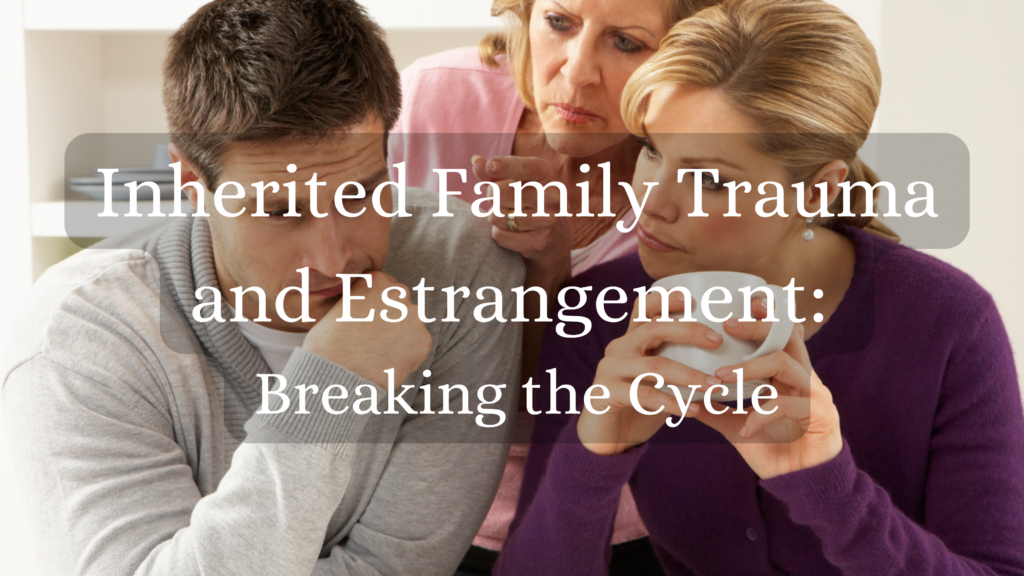Inherited Family Trauma and Estrangement: Breaking the Cycle
Have you ever felt that the pain of your family estrangement runs deeper than the surface conflicts?
That, somehow, there is an invisible thread connecting your struggles to wounds that existed long before you were even born. If so, you’re not alone. Many of us carry emotional burdens that didn’t start with us—our anxiety, grief, and fractured relationships may be echoes of a past we never lived but still feel.
This is the profound reality of Inherited Family Trauma, a concept explored in Mark Wolynn’s groundbreaking book It Didn’t Start With You. Understanding how trauma travels through generations can provide clarity, validation, and—most importantly—a path toward healing.
What Is Inherited Family Trauma?
Inherited trauma refers to how unresolved pain, stress, and suffering from previous generations can shape our emotional landscape, influence our behaviours, and even contribute to our estrangement from loved ones.
Trauma isn’t just something we experience; it can be passed down biologically, through gene expression (epigenetics) changes, and emotionally, through the dynamics of our upbringing. If your parents, grandparents, or even great-grandparents suffered a traumatic event—war, loss, displacement, abuse, neglect, or abandonment—the echoes of their suffering may still be living within you.
Studies have shown that the children and grandchildren of Holocaust survivors, war veterans, and those who lived through famine or persecution often carry heightened stress responses, phobias, and patterns of emotional disconnection. They may unknowingly repeat family patterns or reject them so strongly that they create estrangement as a subconscious act of self-protection.
How Inherited Trauma Can Contribute to Estrangement
Estrangement does not happen in a vacuum. While there are real, tangible reasons why families become disconnected, inherited trauma often creates unconscious loyalty patterns, survival strategies, and unresolved grief that can fuel family fractures. Here’s how:
Repeating Unconscious Family Patterns
Suppose a parent is emotionally distant because they were raised by someone who was deeply wounded by their own trauma. In that case, they may pass that emotional distance down to their children without realising it. A child, feeling unseen and unheard, may grow up believing they were never truly loved, leading to estrangement to escape that perceived rejection.
Estrangement as a Survival Strategy
If a family history includes neglect, abuse, or abandonment, the next generation may subconsciously learn that cutting ties is the safest way to protect themselves. Even if the current family dynamic isn’t directly abusive, an adult child might instinctively distance themselves to break an unspoken, unresolved cycle.
Unprocessed Grief Leading to Misunderstanding
Unresolved grief from past generations can manifest as rigid expectations, unspoken resentments, and an inability to express love freely. If parents were never emotionally validated by their parents, they may struggle to validate their children. This leads to cycles of misunderstanding, frustration, and, ultimately, estrangement.
Inherited Guilt and Shame
Many estranged individuals struggle with deep, unexplainable guilt. They feel responsible for family pain in ways they can’t fully articulate. This can result from inherited trauma—when ancestors were exiled, disowned, or abandoned, the pain of that loss may linger in the family field, making later generations unconsciously feel like they must “pay for the past” or carry the burden of the wound.
Estrangement as an Act of Rebellion or Reparation
Some individuals need to separate from their families to create a healthier lineage moving forward. This is often seen in those who have endured toxic family systems—they cut ties not because they don’t care but because they are determined to break the cycle. While painful, this can be a decisive step toward healing generational trauma.
Healing Inherited Trauma and Navigating Estrangement
Understanding that estrangement may be connected to historical wounds, not just present-day conflicts, can help ease self-blame and open the door to healing. Here’s where you can begin:
Acknowledge the Generational Patterns
Take a step back and explore your family history. Ask questions about past traumas, war experiences, displacement, or complicated relationships. You may uncover patterns that provide a deeper understanding of your family’s emotional landscape.
Recognise What You’ve Inherited
Notice the emotional responses that don’t seem entirely yours—patterns of anxiety, avoidance, or hyper-independence that might have been passed down.
Release the Guilt
You are not responsible for the pain that came before you. Healing inherited trauma does not mean repairing toxic relationships at the expense of your well-being. It means becoming conscious of the patterns and choosing a different path.
Self-Compassion and Reparenting
If estrangement has been necessary, offer yourself the kindness and love that may have been missing in your upbringing. You have the right to build relationships that nourish and sustain you.
Somatic and Emotional Healing Practices
Since trauma is stored in the body, practices like Emotional Freedom Technique (EFT tapping), hypnotherapy, guided visualisation, and mindfulness can help release inherited emotional burdens.
Therapy and Support Groups
Working with a therapist who understands transgenerational trauma can be incredibly healing and support groups for estrangement can also provide a sense of community.
Final Thoughts: You Are Not Alone
If you are estranged from family members and feel a deep, unshakable pain, know this: You are not broken. You are healing. The wounds of the past do not have to dictate your future. Understanding inherited trauma can help you make sense of your experience, offer self-compassion, and choose how to move forward—whether that means reconnecting, maintaining boundaries, or simply finding peace with the choices you’ve made.
Your healing journey isn’t just for you—it’s for the generations that come after you.
You are breaking cycles, rewriting the story, and creating space for something new by facing what has been passed down.
If this resonates with you, I’d love to hear your thoughts.
Have you noticed inherited trauma at play in your own family?
How has it shaped your experience of estrangement? Let’s open the conversation together. ❤️
📚Wondering what to read next? Here are some popular blogs which could spark some inspiration ✨

